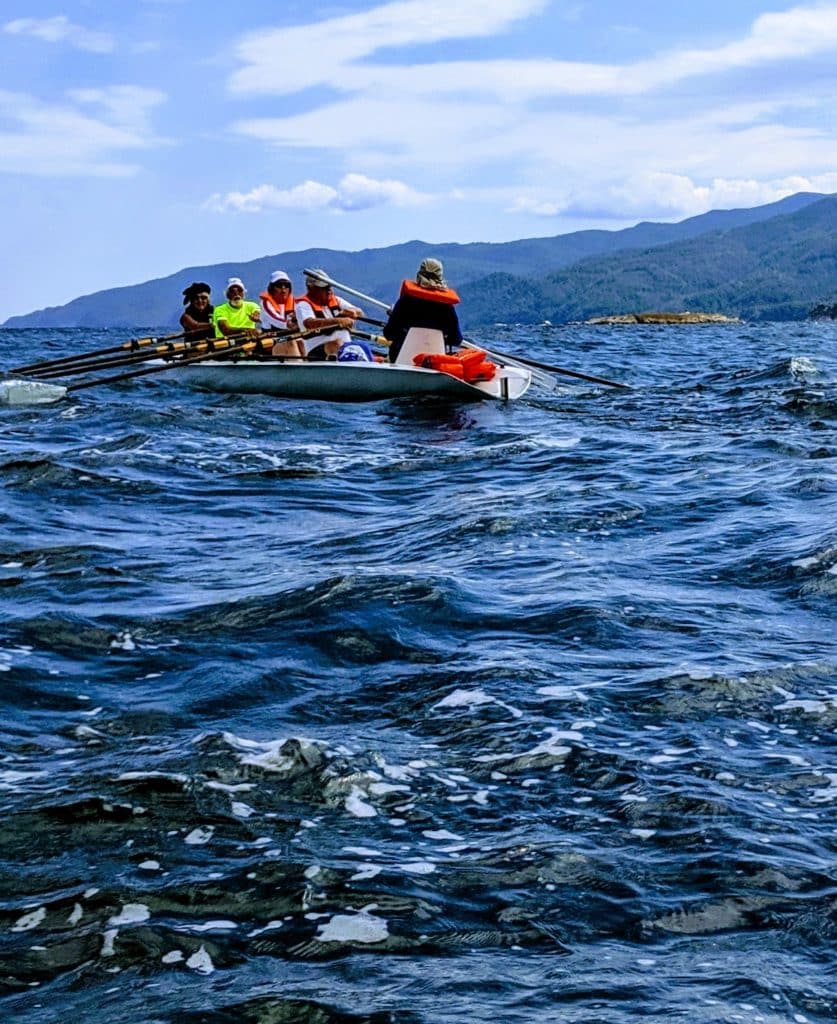
Photo credit – Cathy Senecal
I’m feeling giddy. We climb the crest of one big roller and careen into the trough of another. I’m here on the big, blue swells of the Aegean Ocean in Halkidiki, trying hard to pay more attention to my rowing instructor, and less to the cerulean swells of water surrounding me in this wee double coastal rowing scull. My very first rowing lesson ever happens to be with a tall, dark and charming Greek, Nikos Gkountoulas, who now exhorts me to “dance with the water”. This is rowing Greece’s northern beaches.
While I attempt to row and dance and simultaneously pray to Poseidon, it is just another day at the office for Nikos, an Olympian and coastal rower, as well as our Rowing The World trip guide.
I’ve been writing blog posts for Rowing The World for three years but I am not a rower. I write about non-rowing activities in places where Rowing The World runs trips. Posts such as Let’s Do It for the Reds, Whites and Blacks or posts profiling trip guests, such as Kathy Berezin or, cuteness alert, boathouse dogs: Top 10 Rowing Club Dogs.
Because I had just been on a cycling trip in Rhodes further south, I jumped at the opportunity to join Trip Leader and President Ruth Marr, on Rowing The World’s aptly named, Greece: Northern Beach Paradise trip. The trip, perfectly planned over seven days, was insightful for this non-rower. It increased my understanding of rowing and the global rowing community as well as the appeal of coastal rowing and rowing travel. Besides meeting Nikos, I met some wonderful rowers from Switzerland and was convinced I helped out in the coach boat and with logistics as I drove the van from launch to landing.
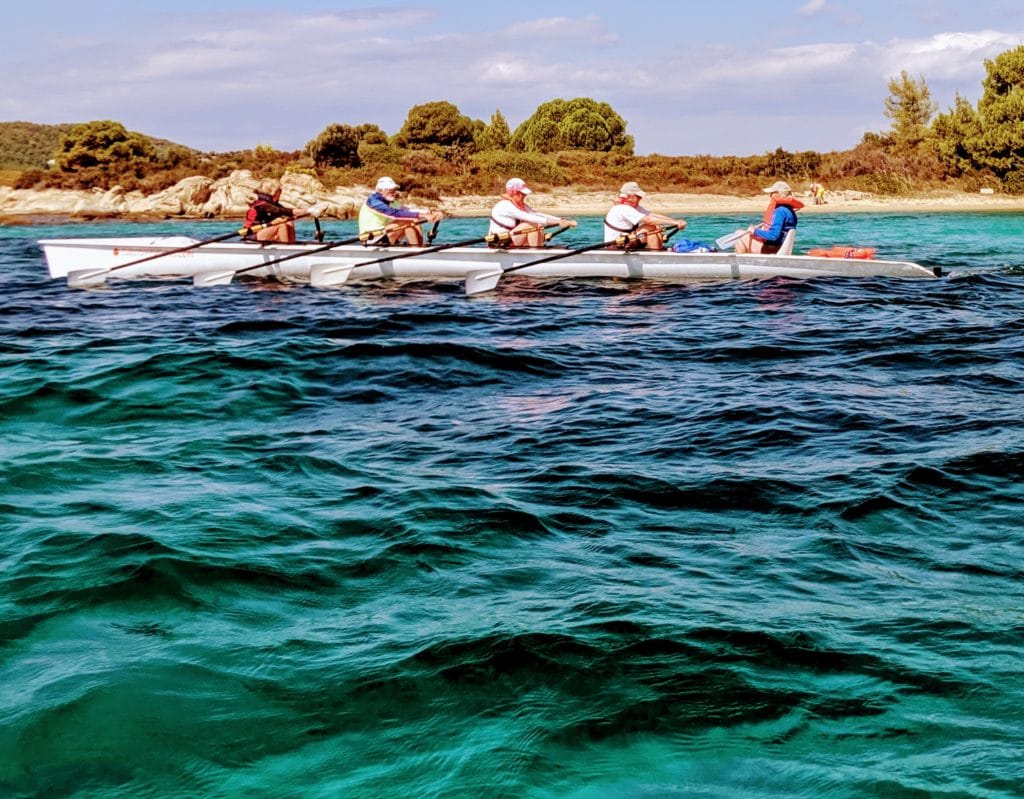
Photo credit – Cathy Senecal
Halkidiki is a stunning part of Greece, boasting an amazing 550kms of coastline and a thousand different beaches. Beaches run the gamut from miles of powdered gold to rocky inlets, some with popular beach bars catering to watersport seekers—or rowers coming in for a strong coffee or cool Mythos beer. Others are hidden from the masses in secluded coves with no road access. All of them though are blessed with crystal clear and turquoise waters reflecting the deep green of the pine forests flanking the shores.
The trip starts in the port city of Thessaloniki. It’s the second biggest city in Greece, but feels manageable and is easy to navigate the downtown area, shop the main streets, and hang out in Ladadika for inspired food and drink.
On a walking tour after lunch, our small group visits the Church of St. Demetrios, the ruins of Roman Emperor Galerius’ 4th-century palace including the Rotunda that has been both a church and a mosque. We are reminded how many words Greek has contributed to the English language—41,614 to be exact—including all the medical terms, and words such as antique, idol, dialogue, geography, grammar, architect, economy, encyclopedia, microscope, etc.
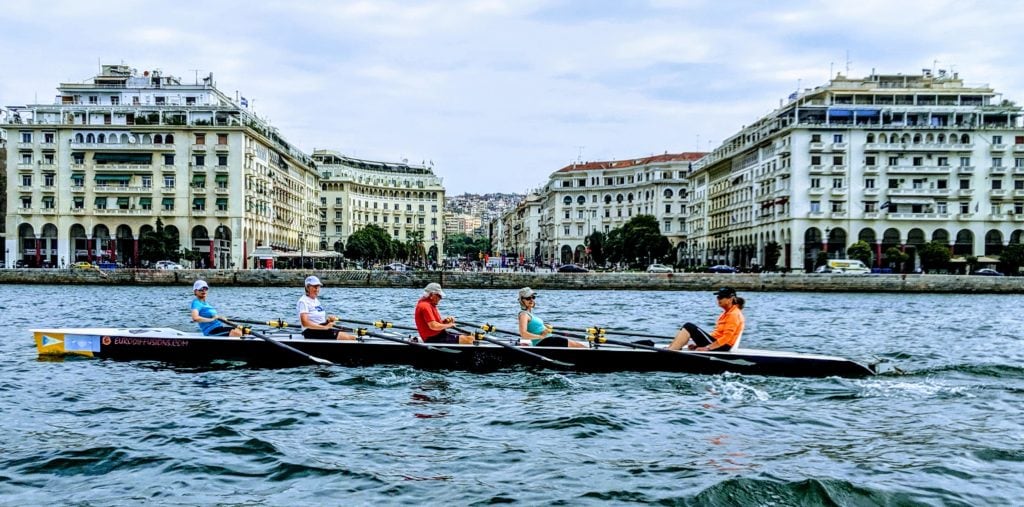
Photo credit – Cathy Senecal
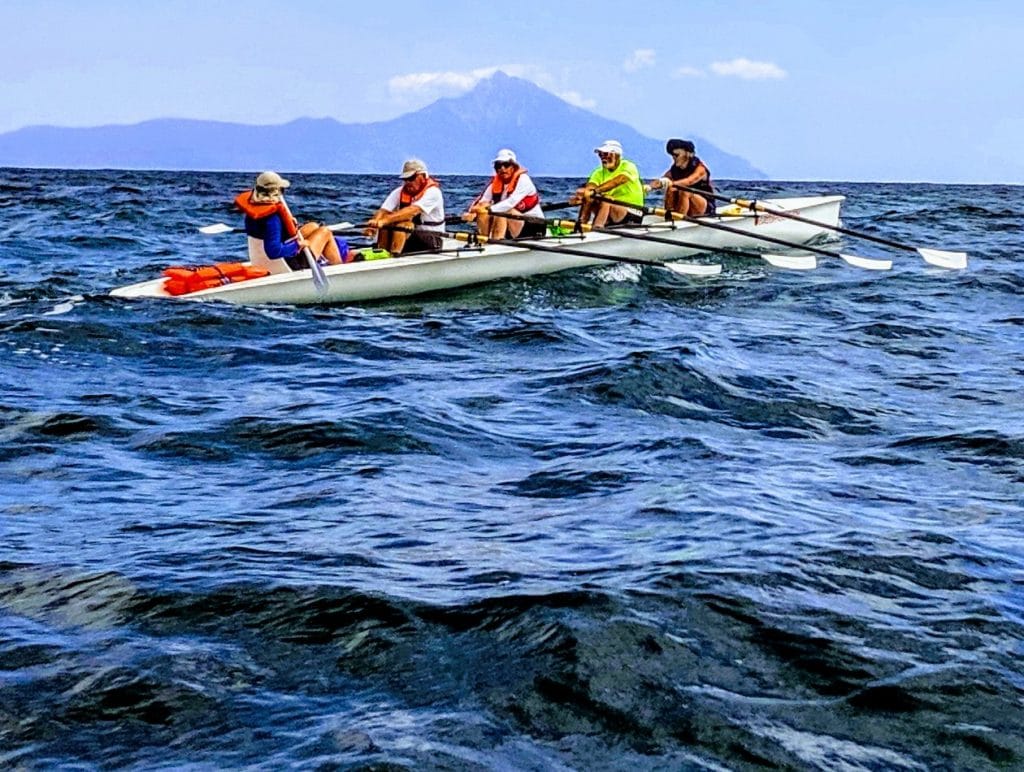
Photo credit – Cathy Senecal
Thessaloniki, one Greek poet said, must be seen from the sea. So, utilizing the boats from Nikos’ club, the Thessaloniki Coastal Rowing Club, the group launches from there and experiences Thessaloniki from the sea on its very first row. Heading out on Thermaikos Gulf on an overcast afternoon, the group boats in a quad and a double, rowing past glorious Aristotle Square, the White Tower, with the old city rising in the distance.
As pleasant and filled with history as Thessaloniki is, the group is eager to head south to Sithonia, the middle of the three beach-lined peninsulas of Halkidiki that are referred to as feet. Sithonia is purported to be the finest of the extremities. The third or east foot is landmarked by the bold, hazy blue Mount Althos, the backdrop to many of our photos. That is as close as we get, since Mount Athos is reserved for a couple of dozen monasteries which only men can visit, and only by permission.
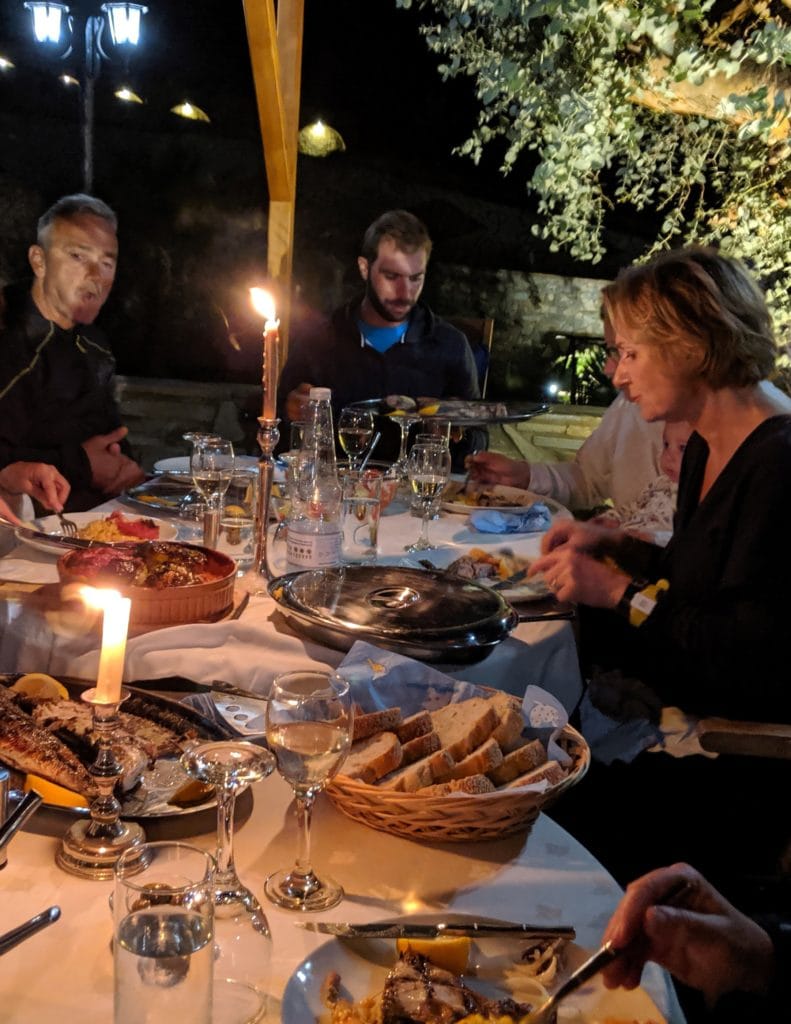
Photo credit – Cathy Senecal
As the tour progresses, we get to know each other, learn a bit of Greek and adapt to the late lunches and dinners, and the seemingly more important, coffee stops, often on a beach. The group learns how to order their favourite coffees. Freddo espresso is cold coffee with two shots of espresso. Americano is plain filtered coffee, like coffee in North America, Greek coffee, is boiled and served with grounds in the cup, almost chewable. Evenings fill with laughs and amazing shared dinners with plates of dolmades, sea bream, bass, grilled octopus, fried squid, roasted lamb, Greek salad, halloumi cheese, and, always, olives. Excellent Greek wines are as welcome as the sweet pluckings of a lyre.
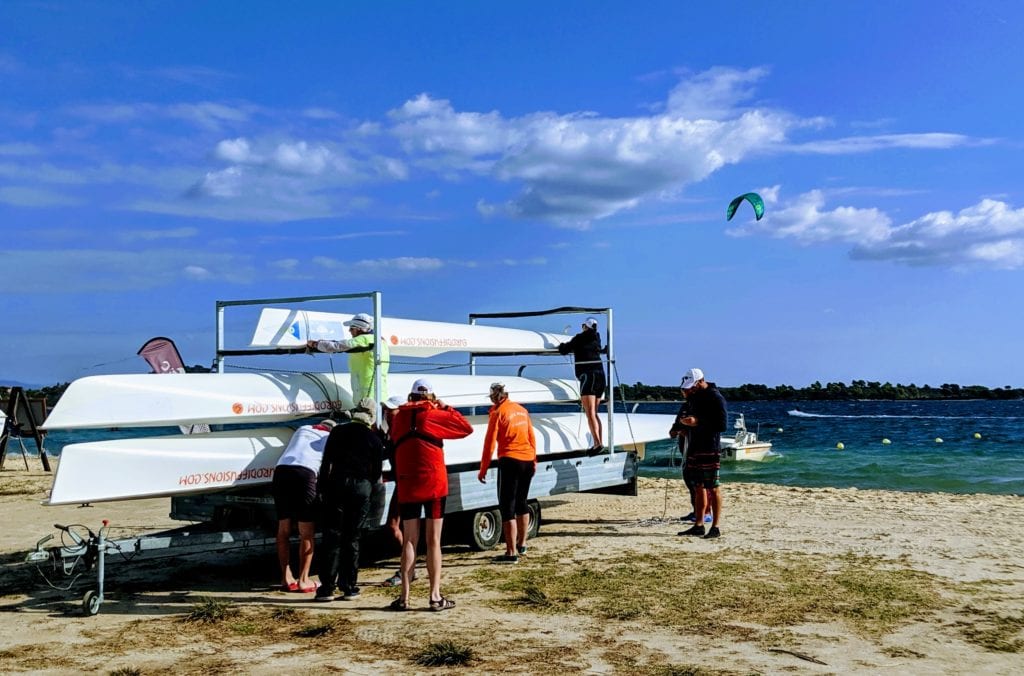
Photo credit – Cathy Senecal
The days go by in a blur of launches and landings, stunning eight- to 14-km rows, and philosophical chats on turquoise waters and shifting coastlines. Once, we drink a kylix or two of the sublime Limnio, a red variety of wine first referred to in The Odyssey, when we are forced by rain to replace one liquid plan with another at the Porto Carras Winery. On the few times we trailer the boats, the group exemplifies Homer’s “Light is the task where many share the toil.”
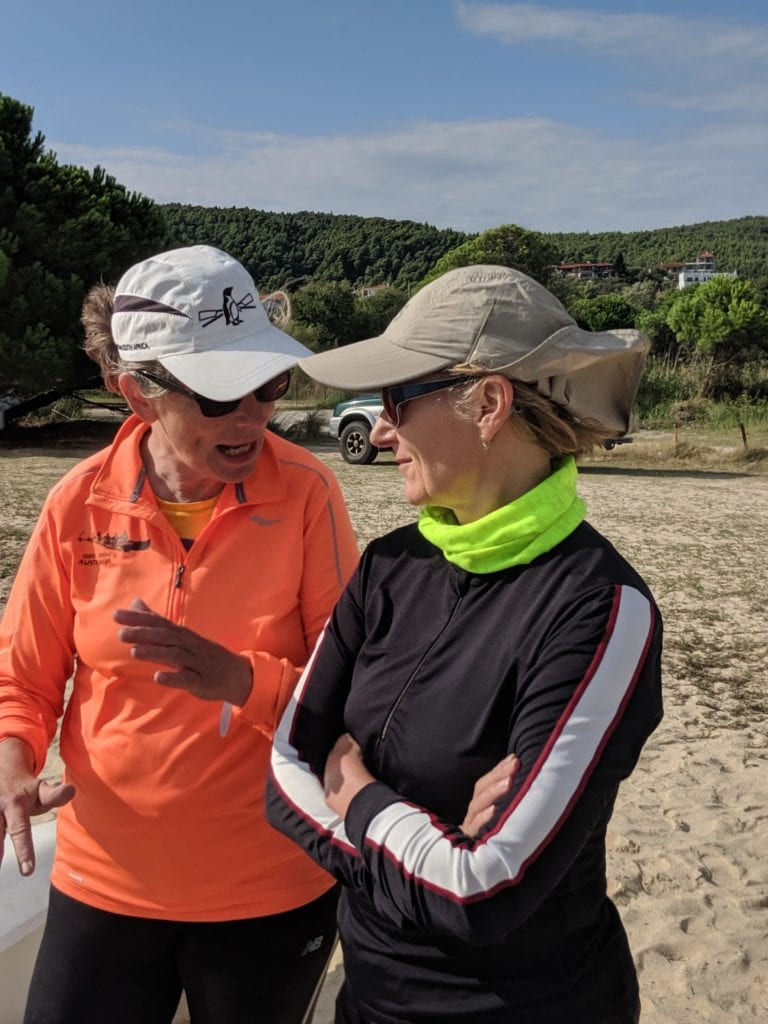
Photo credit – Cathy Senecal
Eva, who has been on at least three RTW trips, can’t pick a favourite, but describes why rowing in Greece is superb. Eva says:
“I rowed in Lithuania on a non-RTW trip, past trees, trees, trees, a cow, then more trees, maybe a fisherman, and another cow. Here, the scenery changes every day: the city; high, rocky coasts; villages in the hills; sandy beaches, either quiet or busy; different sea blues, then the deep dark cove of Port Kouros at the very tip.”
She adds that RTW trips are not only exceptionally scenic, but that almost without intention, the trips are truly cultural because of the involvement of local guides, clubs, and, invariably, many of their friends and associates.
She adds:
“I loved the trip for that very reason.”
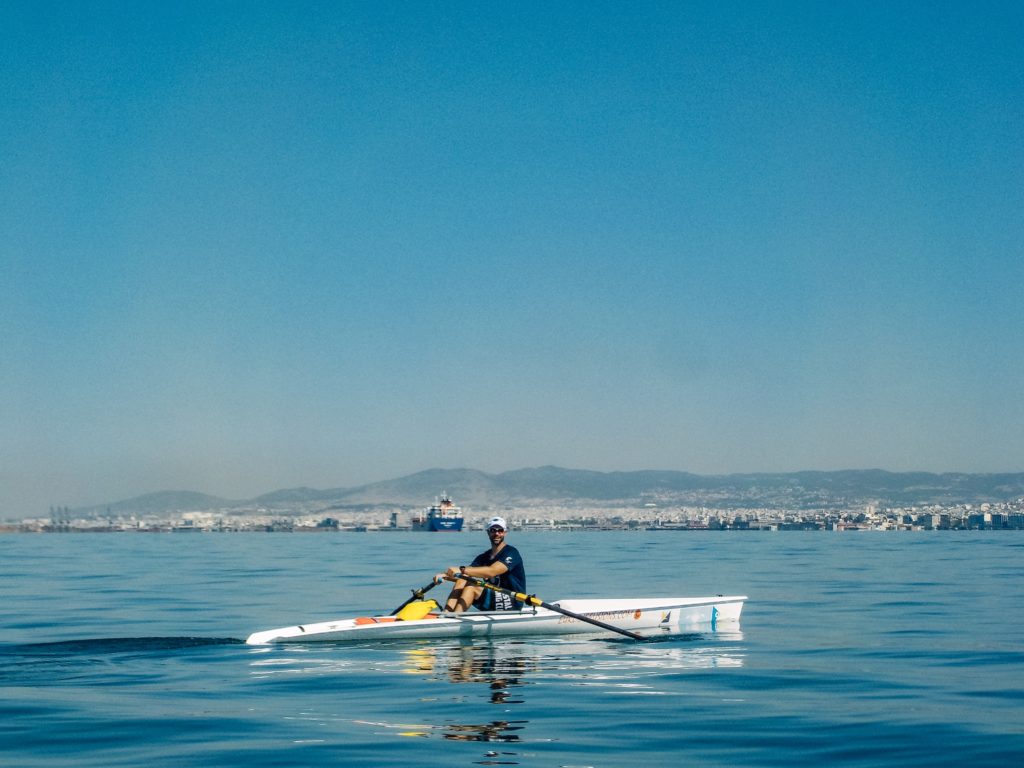
Photo credit – Ruth Marr
Case in point with this Greece trip. The group respects Nikos’ local knowledge and incredible advice on coastal rowing, which he took up as a challenge after his flatwater racing days ended. But as the group spends this week with Nikos, we meet his many friends, and his family, wife Eri and two young sons, Constantino and Victor. We get to know real Greeks, people who share their secret rowing spots, yes, but who also talk freely about the Greek way of life, and about the frustration of their country’s economy, and how that affects them, their families and lifestyles. Today, many travellers crave this real connection with locals. On RTW trips, this local camaraderie is a seamless and unaffected part of the package.
One day departing from Vourvourou—try saying that after a glug from the amphora—as the rowers circle Diaporos Island and before the Blue Lagoon, they see—before feeling—their first taste of open ocean rowing. In a boat following the single, double and quad, I watch as the entire quad briefly falls out of sight sliding into a trough, quickly reappearing on the crest of yet another high wave over and over.
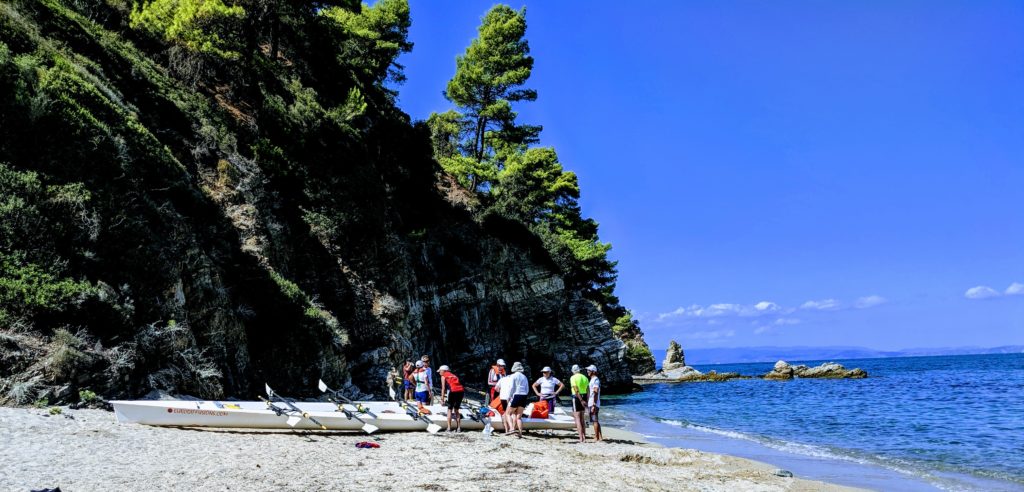
Photo credit – Cathy Senecal
Nikos tells the rowers:
“Relax your shoulders, dance with the water!”
Coastal boats are wider and more resistant to waves, making coastal rowing more accessible and easier to learn than traditional rowing. Still, rowers need to “get” the cadence of the seas with both their bodies and their oars. Seems Nikos’ tips work. Soon, everyone is dancing on the sapphire seas like performers in Zorba the Greek. It’s later that day, I receive similar advice on my wild, first lesson from Nikos as the sun soothes the sea with slanted light.
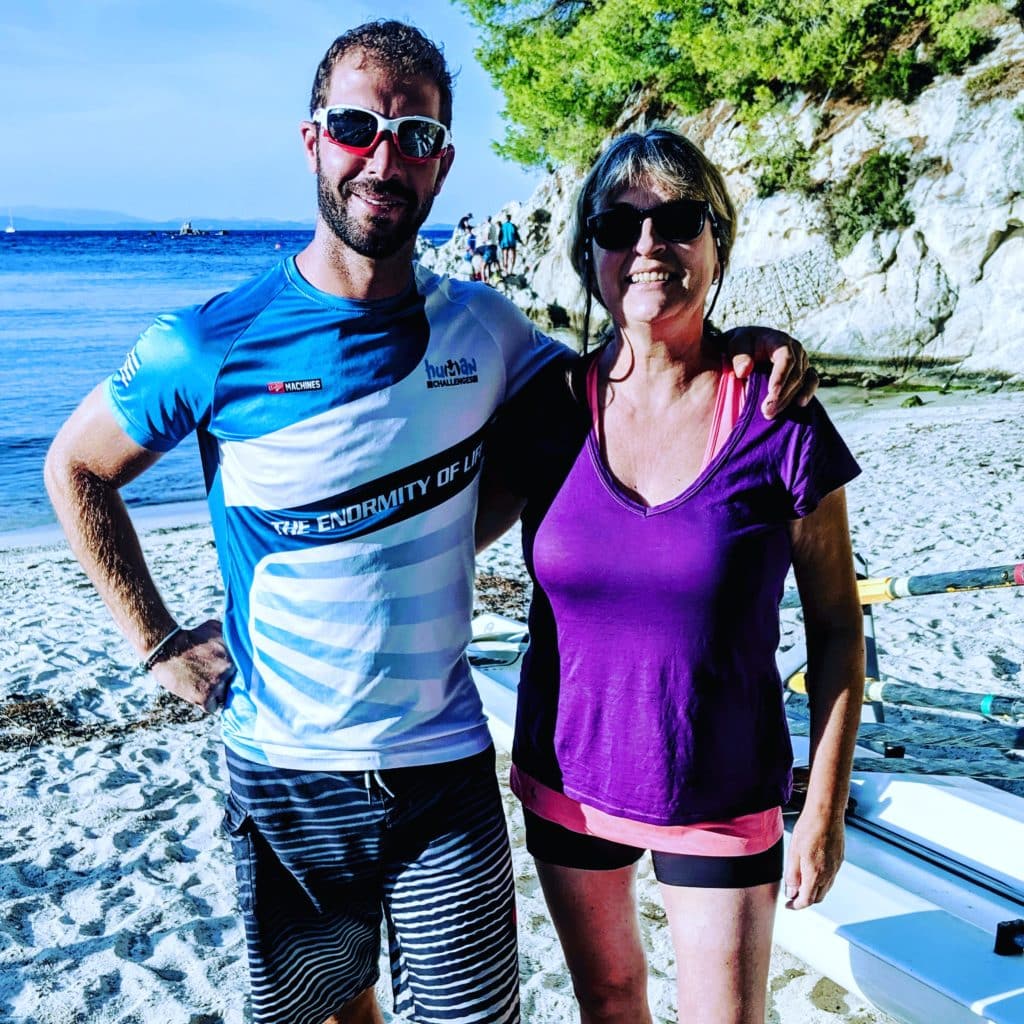
Photo credit – Cathy Senecal
He can talk. Nikos and his twin brother Apostolos won gold, silver and bronze medals from 2004 to 2012 in European and World Championships. After learning about coastal rowing, the Gkountoulas twins placed third at the World Rowing Coastal Championships in 2014 in Greece, their home country.
Whether you do what you love, or love what you do, learning about life in Greece’s quieter, hallowed waters was special for everyone and will remain my little Iliad for a long time.
In September 2023 join us for Greece: Northern Beach Paradise. You can go rowing with Nikos almost any time with Travel2Row’s Thessaloniki Independent Rowing Experience.


[…] recently on Caliper Lake in NW Ontario with my Oar Board. I have “glamped” while enjoying our Greece Northern Beach Paradise Tour. But I have not loaded equipment into a rowing shell or support boat and rowed from campsite to […]